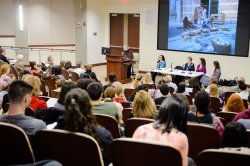The Reggio Emilia Approach: A Panel on the U.S. School System’s Responses to an Italian Educational Philosophy
Scholars, teachers, parents and school directors share perspectives
Posted in: Inserra, Italian News and Events

The Reggio Emilia approach, a revolution in educational philosophy, led by visionary teacher Loris Malaguzzi and parents of young children, began in the villages around the northern Italian city of Reggio Emilia at the end of World War II.
The new philosophy, which focused on infants and toddlers, preschoolers and elementary school children, supported the innate creative, expressive, and problem-solving potential of children, while fostering an ethos of respect, responsibility and community. The Reggio Emilia approach is based on providing young children with a supportive and enriching learning environment based on the children’s own interests – as observed, documented and sustained by their teachers.
On Tuesday, March 15, 2016, Lella Gandini, a leading advocate for the Reggio Emilia approach to early childhood education was joined by Kathleen Berkowitz, Director of A Child’s Place School in Lincroft, New Jersey; Debbie Peiscor, a master teacher at the school school; and Gina Miele, an assistant professor of Italian at Montclair State who is also an informed parent of children at A Child’s Place School, for a presentation and panel discussion about the groundbreaking educational approach. The Inserra Chair in Italian and Italian American Studies designed and organized the event.
A Relevant Program
“Talking about things Italian is an occasion to talk about relevant issues in our society,” says Inserra Chair in Italian and American Studies and Italian professor Dr. Teresa Fiore, who introduced the speakers and moderated the Q&A session. “This time, I had the pleasure of collaborating with the Ben Samuels Center, which adopts some of the principles of the Reggio Emilia Approach, and the Early Childhood, Elementary and Literacy Education Department, which teaches about the approach in select classes. My colleagues acted as sounding boards within the community of educators in our area, helping to widen our outreach and expand our audience interested in this child-centered approach”
“All children have something to teach us,” insisted Gandini, who also discussed the role of careful documentation that is a hallmark of the program. “Documentation, in short, is a process that makes dialogue and interpretation, discussion and transformation – the work of educators – visible,” she explains.
For Victoria Puig, a professor and graduate programs coordinator in Montclair State’s Department of Early Childhood, Elementary and Literacy Education, the evening was a resounding success. “The combination of the historical context of the Reggio Emilia approach shared by Lella Gandini and the description of its current application locally shared by Kathleen Berkowitz and Debbie Piescor from A Child’s Place School offered a rich understanding of the approach,” she says. “Gina Miele contributed a parent’s perspective and shared how she has integrated the philosophy into her college classroom.”
The videos screened by the speakers were among the evening’s highlights, as they vividly illustrated how children and teachers engage in Reggio Emilia explorations and discoveries.
A Different Approach
Student response to the evening was enthusiastic, according to Fiore.
“This event was right up my alley,” says senior Italian Education major Michael Vicchio. “It talked about a different approach toward education, and also had the input of an Italian professor, which was helpful for me as a future educator.”< For Vicchio, the biggest takeaway was learning how many hours the teachers put into a workweek. “I think that was really interesting, because I believe you should not take a job that doesn’t bring you great joy.” Puig reports that several of her students attended the event. “In our subsequent class session, they shared their insights with their classmates. We integrated the Reggio Emilia method into our discussion of building partnerships with children with disabilities and their families.” Students taking Italian Contemporary Cultural Studies had read about the approach before the event. “Some of them are already working on final projects including observations and interviews at Reggio Emilia-inspired schools in New Jersey,” says Fiore, who hopes that the evening will foster a closer study of the approach. “In the long run, we would like to offer an internship at a Reggio Emilia school in Italy, if conditions allow for it. It would be a perfect combination of two disciplines that the University supports: Education and Italian Studies.” Watch the full footage of the event
For more on this event visit the event’s page
